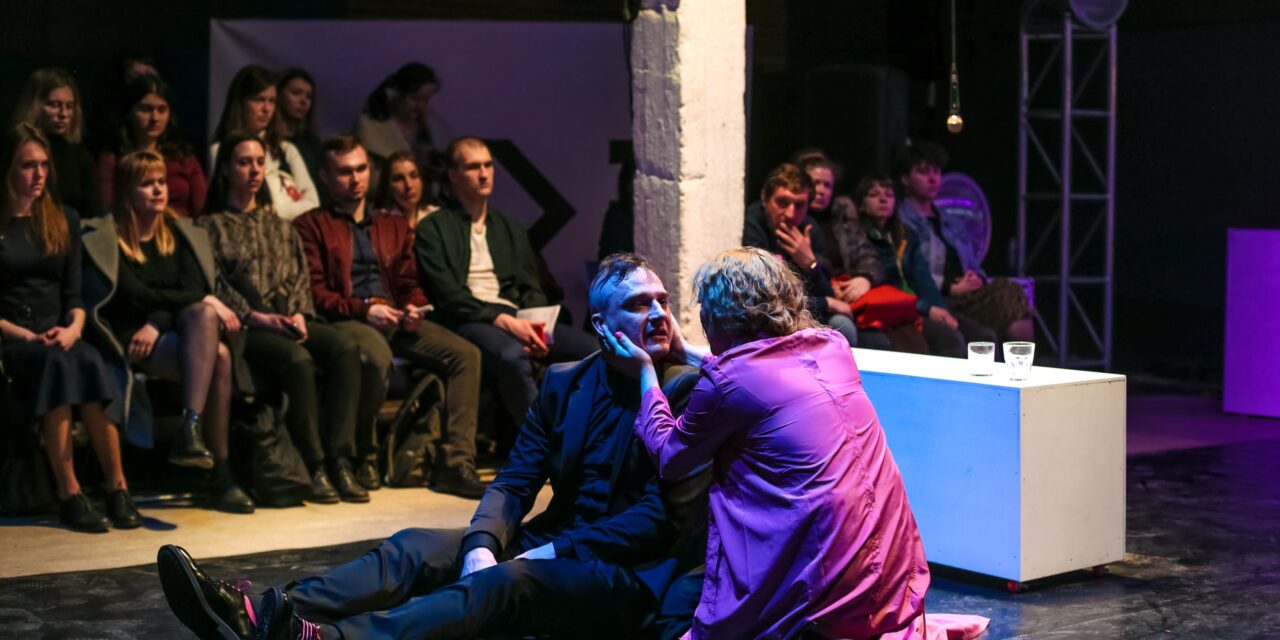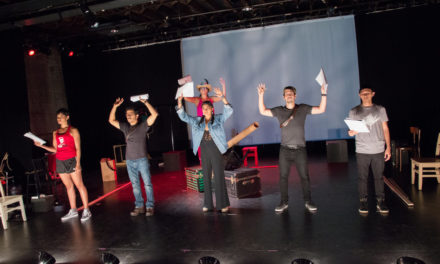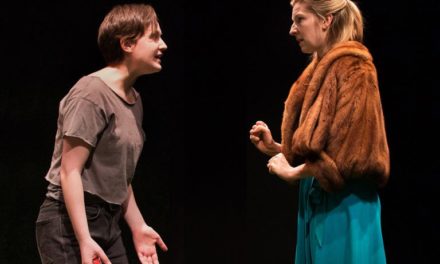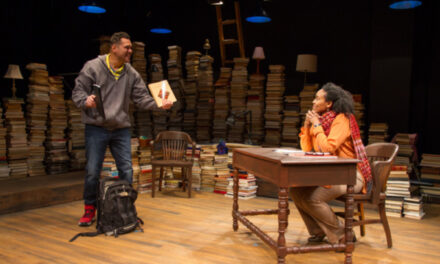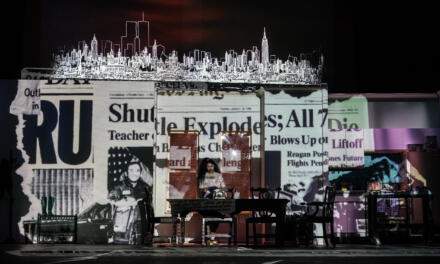The global pandemic of coronavirus infection has stopped theatrical activity around the world. Although no quarantine measures have been officially introduced in the Republic of Belarus, including no restrictions on mass events, the vast majority of viewers chose not to visit theaters. While state theaters have been supported by the government, the independent private theater initiatives are forced to look for means and ways of survival.
To discuss the current independent Belarusian theater condition during the lock-down period Katsiaryna Saladukha (the Producer of HomoCosmos Independent Theatre Company), Inna Kovalenok (OK16’s theatrical projects producer), Valentina Moroz (the art and stage director of the ECLAB Laboratory of Social Theater), Anjelika Krashevskaya (the director of the Center for Visual and Performing Arts “ART Corporation”), Viacheslav Inozemcev (the director and actor of Physical Theater “InZhest”, art-director of Experimental Physical Theaters Forum “PlaStforma”), and Irina Kiselyova (the Artistic Director of the “Family Inclusive Theater”) gathered together to answer our questions.
Alexander: Although Belarus has no quarantine measures, the vast majority of the audience preferred to abstain from going to the theaters. How would you describe the situation encountered during the coronavirus outbreak?
KS: We had to move all our shows to a later date. Both tours and participation in various festivals were canceled as well. As a result, we’ve suffered financially. Private theater companies are directly dependent on ticket sales, there are practically no other sources of fundraising. We pay salaries, taxes, and rents, and also collect funds for new productions only by the means of our box-office.
IKo: We’ve put ourselves in quarantine before it became clear that an outbreak would occur in the OK16. Since March 15, no events have been held at the venue. It is sad and difficult, but the situation is common to everyone.
VM: A significant part of society is not expecting any support from the state. We are trying to earn money by ourselves and to solve current problems with the help of the cultural community. In the current situation, the state could become the defender of the cultural projects, but it did nothing to support them. In particular, we had to abandon our rehearsal space and terminate the lease, due to the inability to pay the rent. As a result, we’ve become thrown out on the street.
AK: The audience didn’t just refuse to go to the theater. Even in the absence of official quarantine, people prefer a lifestyle that will help them to protect themselves. This is the problem of uncertainty when you do understand the inevitability of quarantine. However, the decision has not been made and the situation is all about playing for time. This means that the period of return to real work will be delayed for us.
VI: The “InZhest” Physical Theater makes large open-air and site-specific performances, collaborations with foreign colleagues, regular workshop projects by Viacheslav Inozemcev according to the original “Dance of the Beasts” method, as well as the organization of the annual Experimental Physical Theaters Forum “PlaStforma”. Unfortunately, all the options for this activity have been canceled, reduced by 90%, or indefinitely postponed since March 2020.
IKi: It’s quite hard to answer the question. I think that not attending public events during a pandemic is right. I believe that the theaters should have been provided with financial assistance to release the troupe on paid additional leave.
Alexander: How long can survive your theater under the pressure of current circumstances?
KS: We’ll remain and will return as soon as possible.
IKo: The situation in the OK16 is slightly different, let’s say, from an independent company. The OK16 is a cultural hub that gathers a variety of activities under its roof: performances, exhibitions, conferences, and even parties. That’s why we give the issue of returning to offline activities (including the financial side) a comprehensive review. The same applies to the employees: each of us has own special responsibilities (like the theatrical activities for me), but there are several common tasks as well. So while we don’t hold any performances offline, the part of the team is working on the other projects.
VM: When it comes to talking about the ability of independent theaters to survive, the situation is very individual for each specific case. If shows are the only source of income for the staff, then we are talking about a month or two. It depends on the “financial safety bag” of each team member. But let’s be honest the income of actors in Belarus is a very little one. If the actors work in state theaters, the chances to survive the current situation are more plausible.
AK: Like many other independent theaters, we do not receive any subsidies. We are self-financing. We have obligatory expenses that paid from incomes, which we don’t earn now. We have a small theatrical team that has no other sources of income, thus needs support. So we try to support them since without a permanent staff it will be impossible to renew after the pandemic is over. Today, one must either to close and fire everyone or to look for ways to hold out somehow.
VI: “InZhest” Physical Theater exists as an independent art project since 1980. During this time we’ve lived through many difficult periods: lack of money, prohibitions of performances, and creative crises. Leading actors left us, cult performances disappeared from the repertoire. But the theater is still alive, and we hope that next year we will celebrate its 40th anniversary.
IKi: In such conditions as we’ve faced now, the theater does not function at all, except for a small production group that works on a remote. Our theater is needed only when it is necessary. We have a very specific theater.
Alexander: How easy it will be to be back on track?
KS: It will not be easy for various reasons: economic (because of the stopped activity we will have to raise funds for new productions, and the audience is in a quite hard financial situation now), psychological (we don’t know whether the audience will easily overcome the barrier of close social contact, and how soon a viewer will be ready to be indoors with a crowd of people).
VM: Back on track will be quite difficult. It will take time. Perhaps someone will not be able to revive their projects.
AK: Not easy indeed. But if you’ll keep the staff and the passion, it will definitely speed up the process. However, the audience is unpredictable. We can make every effort to remain work, but the audience will refuse to go to the theater, due to the raised importance of survival in the new difficult economic conditions.
VI: It all depends on when the restrictions will be canceled. Of course, every lost season, every lost year is almost a tragedy both for a theater, and an actor, since we are not getting younger from year to year.
IKi: It will be quite hard. Everything will depend on the return time. If it takes up to the autumn it is one thing. If it takes a year it will be completely another. We won’t be able to keep the unique pedagogues and children team in such conditions.
Alexander: Have you contacted your audience to support the team? If so, how does your audience react to the call?
KS: Over the years, HomoCosmos theater has gathered a friendly and devoted audience. We have appealed to our audience as a part of the charity initiative #ArtProezdnoy (“Art-travel-card”) at the molamola, the crowdfunding site. We do not just ask for money, we offer to book open tickets for future HomoCosmos performances. We haven’t raised a lot of funds so far, but we hope this campaign to be successful. Our audience trusts us and supports us by not returning the tickets for the delayed shows, waiting for our return.
IKo: For our projects to be released, we’ve launched a crowdfunding campaign at molamola. It was nice that the first funds were transferred even without the promotion of the campaign. Up to date, there is not so much money we’ve collected. But we are very grateful to all the supporters, their help will allow us to at least pay the artists a minimum wage.
VM: We didn’t ask our audience to support us. We understand that to help us (for example, pay the rent), a large amount of money is needed. Obviously, in the current situation, people have different priorities. In particular, to raise funds for personal protective equipment for doctors, etc.
AK: We applied for support on the molamola crowdfunding platform.
VI: On March 21, “InZhest” Physical Theater has shown a new stage work after a long break – an impromptu performance of “X-Tradition”, dedicated to the 60th anniversary of the theater’s director. 50 of the most devoted viewers of our theater came to the premiere.
IKi: We didn’t ask to support us financially since we are sure that doctors face way bigger difficulties now.
Alexander: The popularity of online theater broadcasts has increased dramatically. Have you proposed any online projects to your audience? If so, what kind of online projects?
KS: We are skeptical of online broadcasts. A theater is a living phenomenon, a contact with the audience. Our performances are created on small venues for an intimate “dialogue” with the audience. Not to mention that the quality of the video should be high: it is necessary to shoot a performance as a cinema. But if this might be a specially created project, then why not? We do not plan online broadcasts for our existing performances, but we would like to introduce the audience to the future premieres.
IKo: We are expanding our presence online. Quarantine allowed us to implement a long-standing idea – to start OK16’s YouTube channel. Our OPENSTAGE project has been launched: we’ve made an open call to “burning” art projects that can be implemented in video format with no more than three participants. OPENSTAGE continues OK16 – it develops independent art initiatives. We’ve decided not to broadcast our theatrical performances. Firstly, for safety reasons: even without viewers in the auditorium, you need more than 10 people to work at the same time in the closed space. It was a matter of principle. Secondly, there are monetization questions: our stage shows exist from the tickets’ sale. How is it possible to ask a viewer to pay the same amount of money for the experience that was invented for completely different circumstances? I am not against the phenomenon of online broadcasts, but I stand for their quality, which requires expensive resources, equipment, and specialists.
In addition to OPENSTAGE, we are now working with partners to launch online theater projects. This is the most interesting thing that happens in performative arts: performances in ZOOM, Skype, or by phone.
VM: We do not upload our performances to online videos. Sometimes we record short videos.
AK: Initially, I am an ardent opponent of showing the theater online. The theater needs to be watched live! Records never reflect the real picture. Videos are not always of good quality. However, after discussions, we decided to publish two performances. We also put in open access to some of our lectures.
VI: So far we have not thought much about it. Our performances and classes are lively communication. But life does not standstill. Let’s hope that new technologies will expand our capabilities.
IKi: We practice and rehearse online. Not everything is possible, but we learn and try. Unfortunately, online classes are not suitable for children with autism. With those who can join us online, we are trying to work individually with each one. We do not conduct online broadcasts for viewers.
Alexander: What is the current situation with taxes, rents, and other obligatory payments?
KS: Taxes are a partially resolved issue: since we don’t have any activities now, we don’t have to pay taxes. As for rent, we agreed on deferred payment. However, the issue of financial support for actors and managers left without a livelihood remains an acute issue.
IKo: We are very grateful to the Belgazprombank – owner of the leased premises for the OK16, since we were given rental vacations. Without such help, it would be impossible to stand, so I urge all lessors to meet halfway with their renters (if the situation allows off course). Preservation of cultural spaces is a real source of future budget revenues. This is an investment in educated people who can spend money later, not to mention the value of supporting culture.
VM: We were forced to leave our venue, for which we cannot pay now. The summer is ahead of us, and it is the “dead season”. Even if the pandemic recedes in the next couple of months, there will still be no theatrical activities by the end of summer.
AK: We’ve appealed to various government bodies, and our lessors with a request to reduce the rent or to provide rental vacations. Now we are waiting for the replies. We pay taxes only on accrued wages. And as a cultural institution, we confirm our status in the Ministry of Culture every year, after which we are given a discount on the VAT payments.
VI: Everything is not that bad for the Physical Theater “InZhest”: if we do not have financial activity – there are no taxes. We pay rent only during performances, but there are no shows now. We do not pay rent for the rehearsal base thanks to the Integral Production Association. We are very grateful to them.
The organizers of the “PlaStforma” Forum are in a worse situation: in March, a lot of money was spent on organizing and advertising the performances of foreign artists, on paying a tour certificate (for the right to show foreign performances in Belarus), but all these performances were canceled, and no one will return the money.
IKi: No one has reduced the rent. On the contrary, they’ve increased it. We will request the reduction of the rent. The taxes are paid. And when there is no income, then there’ll be no taxes to pay.
Alexander: What are your prospects for theater after emerging from a pandemic?
KS: We believe that we will stand. The theater will remain in demand of the thinking audience if preserving an intimate conversation with the audience on relevant topics. Surely there will be more digital technological solutions.
IKo: Will everybody run to the theater after the “hungry for communication” self-isolation, or will they still be afraid of the virus? Or will they like more to interact with the screen? It is impossible to predict. I think all options will take place. But artists can discover something about ourselves that even we do not suspect. This is another reason why it’s important to support artists.
VM: It’s hard to tell. We don’t know what kind of losses we will see at the end of the pandemic. I mean economic and human losses. So it is difficult to make a clear prediction.
AK: Belarus has always had difficult conditions for the survival of an independent theater. It was not easy and will be. I think small teams will disappear.
VI: In the words of the Good Soldier Švejk: “Never was it so that there was no way”
IKi: We are always optimistic. The Theater has many plans. We are going to live and delight the viewer one way or another.
This post was written by the author in their personal capacity.The opinions expressed in this article are the author’s own and do not reflect the view of The Theatre Times, their staff or collaborators.
This post was written by Alexander Mantush.
The views expressed here belong to the author and do not necessarily reflect our views and opinions.

